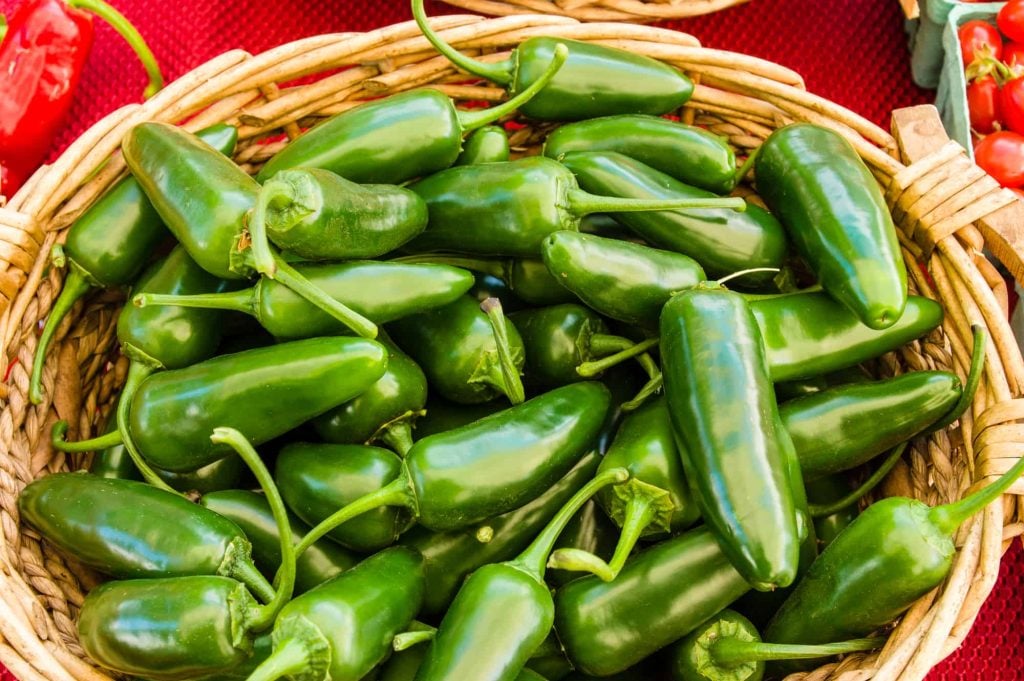Whether you’re worried about food safety or spiciness, you might be wondering whether it’s okay to eat raw jalapenos.
Raw jalapenos are safe as long as good food safety practices have been observed. They’re usually not as hot when cooked, but they still retain many health benefits.
Here’s everything you need to know about the safety and health implications of eating raw, jarred, or cooked jalapenos.
Can You Eat Jalapeno Peppers Raw?
You can eat jalapeno peppers raw. Just make sure you’ve cleaned them by rinsing them under running water for at least 30 seconds and scrubbing the pepper thoroughly to remove any dirt caught in crevices.
It’s important to clean jalapenos because you can get food-borne illnesses like E. Coli and salmonella from unwashed vegetables (source: CDC).
Jarred jalapenos are pasteurized, so you don’t need to heat or rinse them unless you dislike the vinegar mixture they’re stored in. Since pasteurization involves heat, a jarred jalapeno will not taste the same as a fresh jalapeno.
Practice good food safety by storing the jar in the fridge with the lid on and consuming the contents by the best-before date. But what if you have leftover juice? Check out my guide for creative and practical ideas on how to use the leftover juice from those jalapeno jars sitting in your pantry.
Are Raw Jalapenos Good or Bad for You?
Raw jalapeno peppers aren’t necessarily healthier than cooked ones. The cooking process – boiling, in particular – can leach some essential nutrients. Other cooking methods make nutrients more bioavailable, meaning the body can more readily use them.
Cooked jalapenos are usually boiled, broiled, roasted, or baked. A study found that boiled jalapenos had less antioxidant activity, whereas grilled jalapenos had more (source: Food Chemistry).
A similar effect was noted with red peppers. Boiled and steamed red peppers had lower amounts of antioxidants than stir-fried and roasted jalapenos (source: Preventative Nutrition and Food Science). This may be because some antioxidant properties, including vitamin C, dissolve in water (source: SFGate).
You might wonder: if pasteurization kills pathogens, will it also kill helpful nutrients?
There are two methods of pasteurization. The first is heating food to at least 145°F for at least 30 minutes or at least 161°F for at least 15 seconds (source: Science Direct).
Pasteurization may denature some enzymes and make nutrients less available, but there’s nothing to suggest that there are no nutrients left in pasteurized foods. It is simply a necessary safety procedure (source: International Journal of Food Science).
As long as your peppers are clean, you can eat them fresh or cooked. Just remember that oils and excess salt can negate some of their health benefits.
Are Raw Jalapenos Spicy?
Raw jalapenos may taste milder than usual, or they may seem spicier. Plants are sensitive to many factors. The amount of sunshine and water they receive can impact how they taste, including their spice level.
There’s quite a lot of variation in heat when it comes to jalapenos – they range from 2,000 to 8,000 on the Scoville scale. While that seems like a high number, cayenne peppers sit at 30,000 to 50,000 SCU, and some hot chili peppers range from 100,000 to 350,000 SCU.
If you want a detailed comparison of various chilies, including the relative spiciness of jalapenos compared to other popular peppers, we’ve got you covered. It will help you anticipate the effects of using different types of chili pepper in your favorite recipes.
Usually, cooked peppers make them taste hotter because they release capsaicin.
However, when it comes to jalapenos, they may actually lose some spiciness, especially if they’re cooked on high heat for a prolonged period. Briefly frying them on medium heat will have a negligible effect on the spice levels.
Next time you’re served raw jalapenos, rest assured they are safe to eat. In fact, they might even be milder than their cooked counterparts!
Wondering if you can eat jalapeno seeds and what happens if you do? Don’t worry! We’ve addressed that topic as well! Our article covers the safety of eating them and the potential consequences.







Comments are closed.